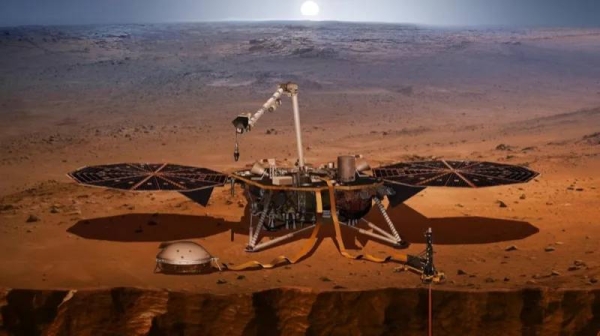
Scientists have found a reservoir of liquid water on Mars, buried deep within the planet’s rocky outer crust. This breakthrough emerged from a new analysis of data gathered by NASA’s Mars Insight Lander, which has been exploring the Martian surface since its 2018 landing. The discovery could provide crucial insights into Mars’ geological and hydrological history.
Detection of Liquid Water Through Mars Quake Analysis
Liquid water has been detected on Mars for the first time, marking a significant breakthrough. While ice is present at the Martian poles and water vapor exists in the atmosphere, this discovery confirms the existence of liquid water on the planet, which has profound implications for the possibility of life and future exploration.
In December 2022, NASA’s InSight mission ended after four years of monitoring Mars’ seismic activity. The lander, which “listened to the pulse of Mars,” provided critical data on the planet’s interior, including details about its crust, mantle, and core. This mission has significantly enhanced our understanding of Martian geology and the planet’s seismic activity, paving the way for future exploration.
Insight Probe Records Over 1,319 Mars Quakes
Scientists use seismic wave speed to determine the material they travel through, a method similar to techniques used in Earth’s water, oil, and gas exploration. Prof. Michael Manga from the University of California, Berkeley, highlighted this connection, emphasizing that these geophysical methods are vital for understanding underground structures on Earth and other planetary bodies water found.
Recent analysis has identified water reservoirs in the Martian crust at depths of six to twelve miles (10 to 20 kilometers). According to Dr. Vashan Wright from UC San Diego’s Scripps Institution of Oceanography, this discovery is vital for understanding Mars’ water cycle, which in turn is essential for comprehending the evolution of the planet’s climate, surface, and interior water found.
Prof. Manga stated that water is “the most important molecule in shaping the evolution of a planet.” This insight addresses the major question of “where did all the Martian water go?”liquid water on Mars highlighting the crucial role of water in planetary development.
The surface of Mars, with its channels and ripples, indicates that ancient rivers and lakes once existed on the planet. However, for the past three billion years, Mars has transformed into a barren desert devoid of liquid water. These findings have been supported by numerous studies and observations, shedding light on the planet’s dramatic climatic changes and its potential to have once harbored life.liquid water on Mars The evidence suggests a stark contrast between Mars’ past and its present state.
Professor Michael Manga suggests that while Mars lost some of its water to space after losing its atmosphere, a significant amount of water might still be present underground. liquid water on MarsHe draws a parallel with Earth, where much of the planet’s water is stored beneath the surface, indicating that Mars could have a similar underground water reservoir despite its atmospheric loss.
The Insight probe’s data suggests that liquid water reservoirs may be widespread beneath Mars’ surface. life.liquid water on Mars If similar reservoirs exist across the planet, scientists estimate that Mars could have enough liquid water to cover its surface with a layer over half a mile deep. liquid water on MarsThis finding enhances the understanding of Mars’ potential to support life and its geological history, pointing to the possibility of extensive subsurface water across the planet.
In a discussion on Martian groundwater, Prof. Manga highlighted the challenges faced by billionaires like Elon Musk in accessing this resource for Mars colonization. The groundwater is located 10-20 km deep in Mars’ crust, making it incredibly difficult to reach. Drilling to such depths, even with advanced technology and significant resources, presents a formidable challenge. Prof. Manga emphasized that drilling a 10 km deep hole on Mars would be a daunting task, even for someone with Musk’s capabilities. This poses a significant obstacle for those hoping to tap into Mars’ water supply for future colonization efforts.